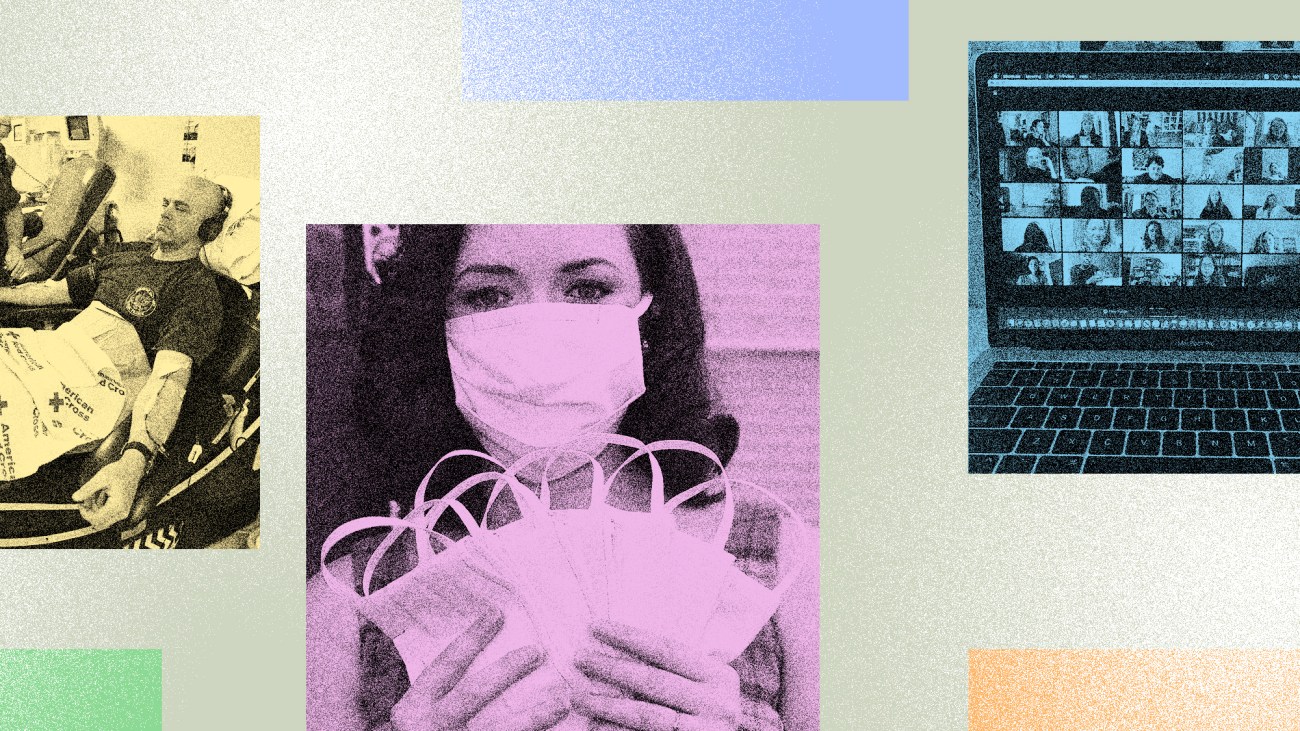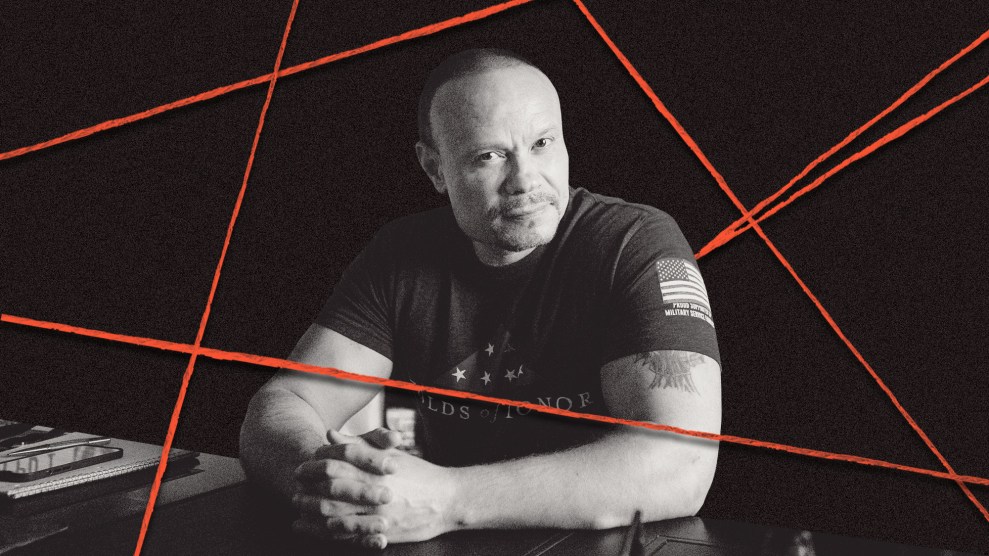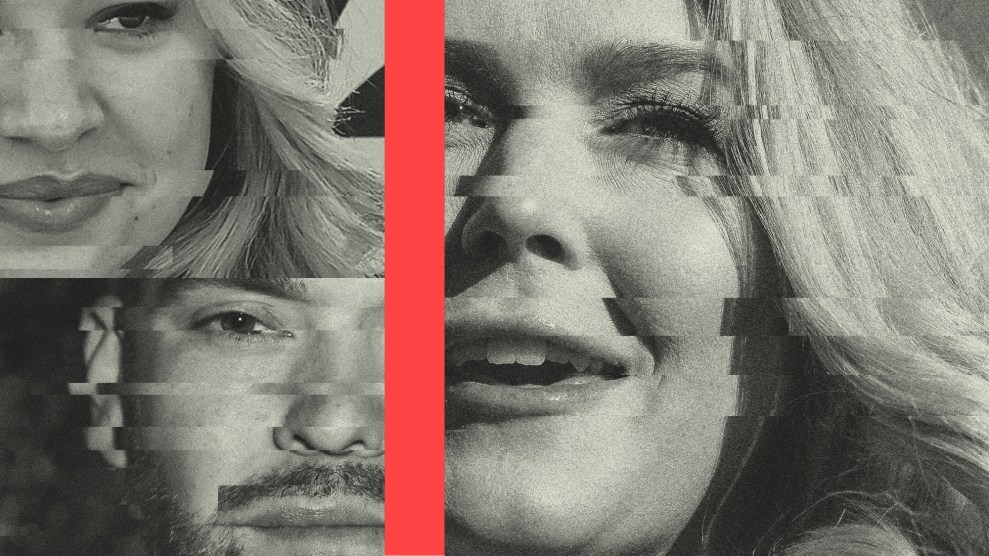
How are you doing? Suddenly, the platitude feels like a real question. In the video check-in with a loved one, in the shouted small talk with the mail carrier, in the smile to a socially distant stranger’s kids, there is an unspoken connection about our everyday interactions, now that we’re interacting less. No really, how are you doing? It’s the question I want to ask you, our readers, too, because this column is our way of checking in with you, find out what’s going on in your lives, and share how we at Mother Jones are thinking about this crisis.
The change that’s turned our world upside down has not been just about a virus, or an economic crisis. It’s been about altruism vs. selfishness. That, after all, is what our great hunkering down is—a sacrifice to protect vulnerable strangers and the strained health care system we so desperately need right now. To be sure, the toilet paper hoarding, social media whining, and fake health advice–sharing are still out there. But ignorant gonna ignorant, and before long, many of those now acting carelessly will learn better.
The far more dangerous selfishness comes from those whose job it is to be here for others, top among them the man in the White House to whom we should be able to look for guidance but instead get lies. From the insistence that the World Health Organization’s data was “false” and that people could go to work while sick, to the straight-from-chain-email medical advice, and most of all, over and over again, the reminders of the amazing job he was doing. Perhaps the only unassailable truth from the White House has been, “I don’t take responsibility at all.”
But honestly, we already knew this. We knew Trump would make the crisis about himself (and his family’s personal gain). We knew he’d soon look for scapegoats, and find them among people of color and the media. We knew it because that’s what he always does.
What we don’t quite know yet is how much further the president’s allies will follow him into his narcissistic fantasy. Some may find the courage to transcend selfishness. Others are risking Americans’ lives and livelihoods to advance their political agenda. But it’s early days.
What of the rest of us? The lizard brain wants us to hide—or lash out and scream our rage from the rooftops. But rage won’t get us through this. Hiding won’t get us through it. The only thing that can possibly get us through is taking action on behalf of others. Choosing to stay home, to (more painfully) tell our kids they can’t be with their friends, and our aging parents we may not see each other for a while. Forgoing the doctor’s visit we don’t 100 percent need. And finding the political will to do the big, altruistic things we have to do to support the millions who will need help taking care of their families and getting treatment.
Besides, never has altruism been more self-interested than it is now. If we each look out just for ourselves, we’ll all end up suffering more. Our loved ones will be more likely to get sick, our hospitals further overwhelmed, our businesses, paychecks, retirement funds at greater risk from selfishness.
And here is what gives me hope: So much of it is happening. People are sewing masks, giving blood, filling out census forms. They are building mutual aid groups to support neighbors and raise money for restaurant workers. And they are finding new ways to organize politically now that no one will knock on doors or go to meetings in person.
Last week the Mother Jones Podcast asked folks to share their stories of helping others, and you can’t find a better listen than the voicemails that came in response. Grocery store workers talked about showing up to work so the rest of us could get fed, and about giving customers an extra smile. Andrea Gladson, a pilot in Southern California, used Facebook to “brainstorm all the ways we can figure out how to keep our small town alive and connected and not adversarial, because certainly with politics that’s happened a lot in the last couple of years.” And so much more.
How about you, reading this now? How have you been coping? What has you worried? (Sharing with others, including us at MoJo, may lighten the burden.) What are you doing to help others? We’ll share your responses in a future post—it’s another way we can remind ourselves of how connected we all are, despite everything.
Here’s what’s on our journalism minds right now: What does focusing on altruism mean for our work? How can we—as individuals and news organizations—do the right thing for others, and what selfish things should we stop doing?
Some of the obvious steps are, well, obvious. All over the place, news organizations are dropping their paywalls for coverage of the pandemic, allowing readers to access important information whether they can pay or not. (Mother Jones’ website is always free, as are our email newsletters, because readers support our mission of getting important stories out widely.) Journalists are sharing vital health information, explaining how the crisis is affecting every corner of our lives, and showing up where they need to for essential on-the-ground coverage.
But there’s more to be done—and some things that finally need to stop. For starters, we must, must, must stop amplifying misinformation. It’s not a public service to breathlessly aggregate anecdotes or quotes of dubious provenance. And it’s not “objective” journalism to give unfiltered, live airtime to presidential campaign rallies press conferences that literally put the public at risk. As the Washington Post’s indispensable media columnist, Margaret Sullivan, writes:
Trump is doing harm and spreading misinformation while working for his own partisan political benefit…The press — if it defines its purpose as getting truthful, useful, non-harmful information to the public, as opposed to merely juicing its own ratings and profits — must recognize what is happening and adjust accordingly. (And that, granted, is a very big “if.”)
Another way to put it: It’s time to stop, once and for all, the false equivalency that treats truth and lies as mere claims on “both sides” of an argument. When the president, or anyone else in leadership, lies or even unknowingly spreads falsehoods, we need to say so. We need to stop enabling lies from our leaders “because it’s news that they said it” and instead train a relentless spotlight on those seeking to deceive us. And we need to, as media critic Jay Rosen puts it, shift “the focus of our coverage from what President Trump is saying to what his government is doing.
For years now, audiences and experts have been pleading with media organizations to abandon habits that are destructive in a crisis of democracy. But now that we face a health and economic crisis on top of that, there are even more difficult and complex questions we need to confront. Most of all: What should a journalism of altruism look like? Do we need to think about whether our stories are actually helpful—beyond of the “all information is good” default? Is a particular story more likely to leave people informed and perhaps even able to take action, or to make them feel powerless and terrified? What about amplifying factoids and anecdotes that are technically true, but lack context—like the bazillion headlines about the coronavirus on cardboard? The Pomeranian that tested positive for coronavirus? (You can pet your dog, it’s totally fine.) Do we have a duty of care for our audiences, a duty to think about the impact of our work before we publish? And at which point do we need to hand responsibility off to our audiences, lest duty of care turn into disempowerment or paternalism?
These questions are not new. But usually they are debated in the abstract, in think-tank forums and academic journals. Rarely do they take priority in the executive suites of media companies. But Mother Jones, as a reader-supported nonprofit, can do things differently. We can just straight up ask you.
What do you think Mother Jones’ biggest priority in covering the coronavirus should be right now? Where can we have the greatest impact? How can we be more altruistic?
Here’s what our newsroom has been doing so far. Starting in February, when it became clear that this crisis was going to involve a major public health, economic, and perhaps political upheaval, our journalists have published up to a dozen stories each day exploring the impacts—you can find all of MoJo’s coverage here, and also in the new rapid-response blog here. Building a newsroom that could pivot to the biggest story of the moment was a major reason we turned to readers for support these past few years; we couldn’t have guessed it would be like this, but it’s incredible how this support has allowed us to turn on a dime when we needed to. So far, our journalists have been focused on four major categories:
- Profiteering and corruption (including David Corn’s piece on Jared Kushner’s connections to a company that stands to cash in on coronavirus testing)
- Disinformation: For example, fellow Abigail Weinberg debunked the viral hoax that you could drink warm water to protect yourself from the coronavirus. When the chief medical officer at CVS sent that wrong advice to their entire staff, a reader sent us the email, Abigail wrote another story, CNN picked it up, and CVS corrected the email, saving hundreds of thousands of front-line employees from harm. Likewise, data reporter Sinduja Rangarajan looked into the viral spread of misinformation on WhatsApp.
- Exposing the impacts on, and lifting up the voices of, communities—especially those most vulnerable—as they confront new threats and find new ways of organizing. This week’s Mother Jones Podcast—reported in the field just before New York’s shelter-in-place order, and also featuring the voices of Mother Jones listeners—was inspiring.
- And, of course, sounding the alarm (with a level head) on how and why the administration and other powerful institutions and people are responding. Too many examples to pick from, but if you need to blow off some steam with gallows humor, I recommend this weekend’s video of Trump’s actions compared to disaster-movie presidents.
- All while not forgetting about the incredibly high-stakes election we’re in: Kara Voght, for example, looked at the implications for progressives’ ground game, while AJ Vicens focused on election security and concerns that universal vote-by-mail will not be easy to pull off.
Over the past week, so many readers have told us to keep charging hard—on the crisis and everything else that needs to be exposed. You have my promise, we will.
But I have to be upfront with you: It won’t be easy. Already the fallout of the crisis is hitting news organizations hard; even as more people are online looking for information, advertising rates are down. (Facebook, with perfect timing as always, has chosen this moment to make changes that decrease the already low revenue publishers get when you read our stories on their platform.) Everywhere, news sources are laying off staff and reducing pay; many of the nation’s remaining alt-weeklies, the fiercely independent local newsrooms where I got my start, will likely go out of business. Many daily newspapers, squeezed by corporate and hedge-fund owners and crushing debt, will not be far behind. Mother Jones is fortunate in that our support comes primarily from readers like you, but in this economic environment, many people won’t be able to pitch in. If you can, your support will be absolutely vital in keeping our reporting going.
I don’t know how we’ll keep doing what we have to do the next few months. But I know there’s no one I’d rather do it with than the Mother Jones community. As disorienting as these past few weeks have been, they’ve shown that what we do matters. How we react individually and as neighborhoods, cities, and a society matters. Coming out of this together matters. And the things that so many of you are doing are part of the only thing that can defeat this virus, and the challenges yet to come: a social immune system.
That immune system has been much under attack recently—from panic and deception, from greed and profiteering, from political road rage and the “drown it in the bathtub” school of government. We’ll need to build it anew, and build it in such a way that it truly can benefit everyone. You have already begun.














